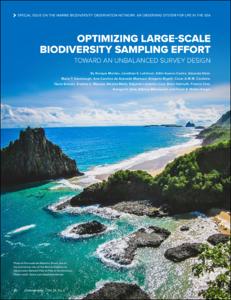| dc.contributor.author | Montes, Enrique | |
| dc.contributor.author | Lefcheck, Jonathan S. | |
| dc.contributor.author | Guerra-Castro, Edlin | |
| dc.contributor.author | Klein, Eduardo | |
| dc.contributor.author | Kavanaugh, Maria T. | |
| dc.contributor.author | de Azevedo Mazzuco, Ana Carolina | |
| dc.contributor.author | Bigatti, Gregorio | |
| dc.contributor.author | Cordeiro, Cesar A.M.M. | |
| dc.contributor.author | Simoes, Nuno | |
| dc.contributor.author | Macaya, Erasmo C. | |
| dc.contributor.author | Moity, Nicolas | |
| dc.contributor.author | Londoño-Cruz, Edgardo | |
| dc.contributor.author | Helmuth, Brian | |
| dc.contributor.author | Choi, Francis | |
| dc.contributor.author | Soto, Eulogio H. | |
| dc.contributor.author | Miloslavich, Patricia | |
| dc.contributor.author | Muller-Karger, Frank E. | |
| dc.date.accessioned | 2022-01-04T16:31:11Z | |
| dc.date.available | 2022-01-04T16:31:11Z | |
| dc.date.issued | 2021 | |
| dc.identifier.citation | Montes, E., Lefcheck, J.S., Guerra-Castro, E., Klein, E., Kavanaugh, M.T., et al (2021) Optimizing large-scale biodiversity sampling
effort: toward an unbalanced survey design.
Oceanography, 34(2), pp.80–91. DOI: https://doi.org/10.5670/
oceanog.2021.216. | en_US |
| dc.identifier.uri | https://repository.oceanbestpractices.org/handle/11329/1836 | |
| dc.description.abstract | Acquiring marine biodiversity data is difficult, costly, and timeconsuming,
making it challenging to understand the distribution and abundance of life
in the ocean. Historically, approaches to biodiversity sampling over large geographic
scales have advocated for equivalent effort across multiple sites to minimize comparative
bias. When effort cannot be equalized, techniques such as rarefaction have been
applied to minimize biases by reverting diversity estimates to equivalent numbers of
samples or individuals. This often results in oversampling and wasted resources or
inaccurately characterized communities due to undersampling. How, then, can we better
determine an optimal survey design for characterizing species richness and community
composition across a range of conditions and capacities without compromising
taxonomic resolution and statistical power? Researchers in the Marine Biodiversity
Observation Network Pole to Pole of the Americas (MBON Pole to Pole) are surveying
rocky shore macroinvertebrates and algal communities spanning ~107° of latitude
and 10 biogeographic ecoregions to address this question. Here, we apply existing techniques
in the form of fixed-coverage subsampling and a complementary multivariate
analysis to determine the optimal effort necessary for characterizing species richness
and community composition across the network sampling sites. We show that oversampling
for species richness varied between ~20% and 400% at over half of studied
areas, while some locations were undersampled by up to 50%. Multivariate error analysis
also revealed that most of the localities were oversampled by several-fold for benthic
community composition. From this analysis, we advocate for an unbalanced sampling
approach to support field programs in the collection of high-quality data, where preliminary
information is used to set the minimum required effort to generate robust values
of diversity and composition on a site-to-site basis. As part of this recommendation,
we provide statistical tools in the open-source R statistical software to aid researchers in
implementing optimization strategies and expanding the geographic footprint or sampling
frequency of regional biodiversity survey programs. | en_US |
| dc.language.iso | en | en_US |
| dc.rights | Attribution 4.0 International | * |
| dc.rights.uri | http://creativecommons.org/licenses/by/4.0/ | * |
| dc.subject.other | MBON | en_US |
| dc.subject.other | Survey design | en_US |
| dc.subject.other | Biodiversity monitoring | en_US |
| dc.title | Optimizing large-scale biodiversity sampling effort: toward an unbalanced survey design. | en_US |
| dc.type | Journal Contribution | en_US |
| dc.description.refereed | Refereed | en_US |
| dc.format.pagerange | pp.80-91 | en_US |
| dc.identifier.doi | https://doi.org/10.5670/oceanog.2021.216 | |
| dc.subject.parameterDiscipline | Biota abundance, biomass and diversity | en_US |
| dc.subject.dmProcesses | Data acquisition | en_US |
| dc.bibliographicCitation.title | Oceanography | en_US |
| dc.bibliographicCitation.volume | 34 | en_US |
| dc.bibliographicCitation.issue | 2 | en_US |
| dc.description.sdg | 14.a | en_US |
| dc.description.eov | N/A | en_US |
| dc.description.adoption | Validated (tested by third parties) | en_US |
| dc.description.methodologyType | Method | en_US |
| dc.description.methodologyType | Reports with methodological relevance | en_US |
| obps.contact.contactname | Enrique Montes | |
| obps.contact.contactemail | enrique.montes@noaa.gov | |
| obps.resourceurl.publisher | https://tos.org/oceanography/article/optimizing-large-scale-biodiversity-sampling-effort-toward-an-unbalanced-survey-design | |
 Repository of community practices in Ocean Research, Applications and Data/Information Management
Repository of community practices in Ocean Research, Applications and Data/Information Management

